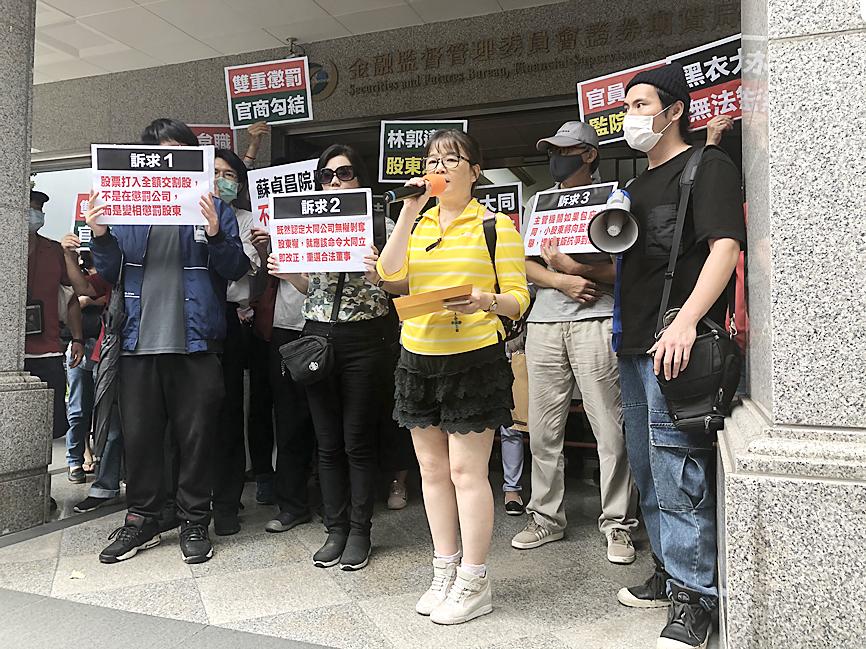Tatung Co (大同) shares yesterday plunged by the maximum daily limit of 10 percent to NT$18.90, the lowest in three months, after the Taiwan Stock Exchange (TWSE) on Tuesday evening changed the company’s classification to a full-delivery stock effective tomorrow.
The TWSE’s move follows the company’s failure to give a clear and satisfactory explanation of why it deprived dozens of shareholders of their voting rights during a board election at the annual shareholders’ meeting on Tuesday morning.
Under the exchange’s regulations, investors are not allowed to engage in margin trading of a full-delivery stock, TWSE spokeswoman Rebecca Chen (陳麗卿) told the Taipei Times by telephone.

Photo: Kelson Wang, Taipei Times
Chen dismissed speculation that the punishment would benefit Tatung management as minority shareholders would find it more difficult to buy the shares.
She said it is a warning to investors that this is a company with high governance risks and they should think twice before buying its shares.
“We demanded that Tatung clarify the dispute at its shareholders’ meeting, but it failed to give a satisfactory answer,” Chen said. “Tatung spent more time explaining its decision to block some shareholders’ voting rights, but the company ignored the fact that it is not a judge nor a government agency.”
“Tatung has set a wrong example of corporate governance,” she added.
Categorizing a company’s stock as full-delivery shares is the third-most severe form of punishment from the TWSE, after suspension of trading and delisting, according to the exchange’s regulations.
Such a punishment is usually meted out to companies with a per-share book value of less than NT$5 or have problematic financial statements, Chen said.
The punishment for Tatung reflects the exchange’s observation that it had seriously breached shareholders’ rights, she said.
TWSE would not relax its punishment until the company clarifies the dispute around the controversial board election, Chen said.
Vivian Tsai (蔡玉真), a Tatung shareholder and a media personality, led a group of 30 Tatung shareholders at a rally outside the Securities and Futures Bureau yesterday.
The group was petitioning the Financial Supervisory Commission to order Tatung to hold a new board election.

In Italy’s storied gold-making hubs, jewelers are reworking their designs to trim gold content as they race to blunt the effect of record prices and appeal to shoppers watching their budgets. Gold prices hit a record high on Thursday, surging near US$5,600 an ounce, more than double a year ago as geopolitical concerns and jitters over trade pushed investors toward the safe-haven asset. The rally is putting undue pressure on small artisans as they face mounting demands from customers, including international brands, to produce cheaper items, from signature pieces to wedding rings, according to interviews with four independent jewelers in Italy’s main

Japanese Prime Minister Sanae Takaichi has talked up the benefits of a weaker yen in a campaign speech, adopting a tone at odds with her finance ministry, which has refused to rule out any options to counter excessive foreign exchange volatility. Takaichi later softened her stance, saying she did not have a preference for the yen’s direction. “People say the weak yen is bad right now, but for export industries, it’s a major opportunity,” Takaichi said on Saturday at a rally for Liberal Democratic Party candidate Daishiro Yamagiwa in Kanagawa Prefecture ahead of a snap election on Sunday. “Whether it’s selling food or

CONCERNS: Tech companies investing in AI businesses that purchase their products have raised questions among investors that they are artificially propping up demand Nvidia Corp chief executive officer Jensen Huang (黃仁勳) on Saturday said that the company would be participating in OpenAI’s latest funding round, describing it as potentially “the largest investment we’ve ever made.” “We will invest a great deal of money,” Huang told reporters while visiting Taipei. “I believe in OpenAI. The work that they do is incredible. They’re one of the most consequential companies of our time.” Huang did not say exactly how much Nvidia might contribute, but described the investment as “huge.” “Let Sam announce how much he’s going to raise — it’s for him to decide,” Huang said, referring to OpenAI

The global server market is expected to grow 12.8 percent annually this year, with artificial intelligence (AI) servers projected to account for 16.5 percent, driven by continued investment in AI infrastructure by major cloud service providers (CSPs), market researcher TrendForce Corp (集邦科技) said yesterday. Global AI server shipments this year are expected to increase 28 percent year-on-year to more than 2.7 million units, driven by sustained demand from CSPs and government sovereign cloud projects, TrendForce analyst Frank Kung (龔明德) told the Taipei Times. Demand for GPU-based AI servers, including Nvidia Corp’s GB and Vera Rubin rack systems, is expected to remain high,